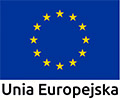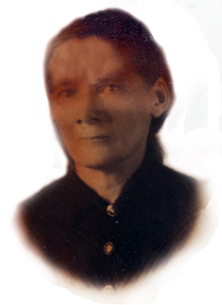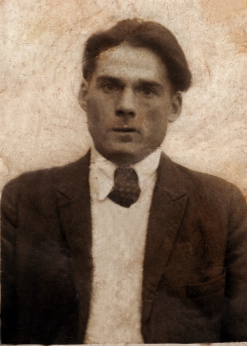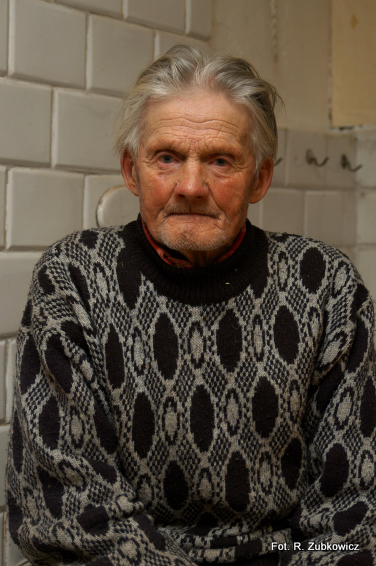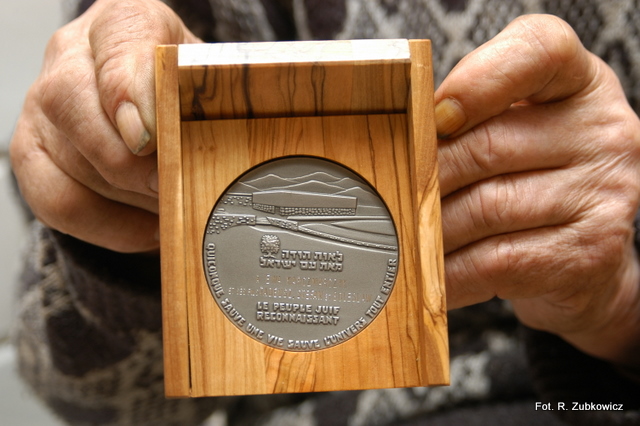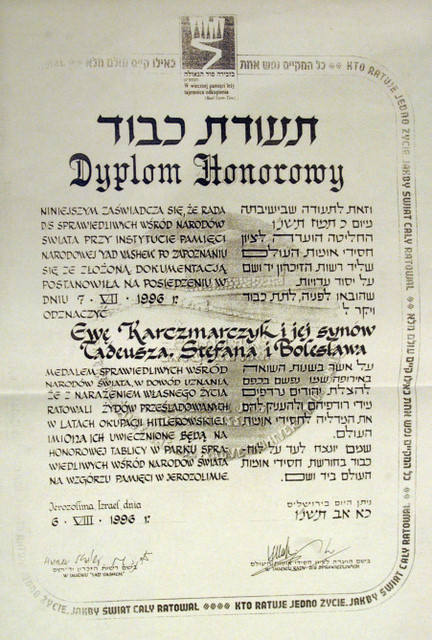The Righteous from the Treblinka area - the Karczmarczyk family
RIGHTEOUS: Tadeusz Karczmarczyk
Born in 1922; the son of Tomasz (died in 1945) and Ewa (born in 1889, died in 1973). Brother of Stefan (born in 1915, died in 1983), Bolesława (born in 1926), Halina and Stefania.
He received the medal in 1996 together with his mother Ewa and two brothers – Bolesław and then deceased Stefan.
Tadeusz Karczmarczyk is a kind of man who mentally does not give in to the passage of time – he has kept a cheerful and sharp gaze, jokes and does not try to worry about what is not needed. Although he is approaching his nineties, he is still in good health and is not lacking in enthusiasm. It was these qualities that helped twenty-year-old Tadek save the lives of a few friends Jews.
He comes from an agricultural family who had a nine-morgen farm in the 1940s. The farm was not large, but “For some people there was scarcity, but never in our home”, says Tadeusz.
There was also enough bread to share with those in need. They lived a group of Jews who lost their belongings fleeing from the Germans to the Soviet-occupied zone. After the German attack on the USSR, these people were accommodated in one of the rooms of a small house of the Karczmarczyks. When the extermination of Jews from the nearby Stoczek, Kosowo Lackie and Węgrowo began in the summer of 1942, the hosts decided to help their tenants – first Tadeusz led them out of the guarded house, then he and other family members hid them on the farm.
Tadeusz Karczmarczyk sent Chana and Josek Szczupakiewicz to serve at the friendly hosts estate, hiding the fact that they were Jews. While helping on the farms, they waited until the end of the war. Chana’s and Josek’s mother – Chaja and her sister Aida Wróblewicz (Midziński after her husband) survived on the Karczmarczyks’ farm. The Karczmarczyks also helped Mosze Szczupakiewicz, Chaja’s husband and their youngest child, Srulek. Srulek lived to see the end of the war, hidden as a foster child in the vicinity of Stoczek. Chaim, a tailor from Kalisz who was murdered a few weeks before the Germans withdrew, also relied on this help.
After the war Tadeusz kept in touch with the survivors who lived in Ostrów Mazowiecka for some time. There he met his wife Regina, who came back from an exile in the vicinity of Voronezh. Regina had been composing songs for whole her life. In one of them she tells a tragic story of exile.
The couple lived in Brzózka, in Tadeusz’s family home. They worked as farmers. From people who were helped by Tadeusz’s family Aida, or as the Karczmarczyks called her, Irka, and Srulek still live. Regina and Tadeusz remain in correspondence and telephone contact with Aida. Srulek also wrote a few letters to them.
HIDING: Aida Midziński
Aida Midziński (née Wróblewicz). She was born in 1921 in a village near Ostrów Mazowiecka. Just before the war her family lived in Małkinia. In 1939, she experienced German order and decided to get to the Soviet side (the Soviet-German occupation border ran a few kilometres from Małkinia, leaving her on the German side). The escape was successful, but the Germans robbed the escapees from all their belongings. After 22 June 1941, Aida’s family had nowhere to go back. She started wandering until she finally found herself in the village of Brzózka at the Karczmarczyk family.
Aida was then called Idka. Poles called her Irka. Together with her sister Chaja, her husband Mosze Szczupakiewicz, their three children – Srulek, Chawa and Josek, and father Icchak, she found herself at the Karczmarczyks. Apart from them, the four-person family of an unknown surname, remembered as “Majors” from the name of the head of the family, found shelter at the Karczmarczyks.
During her stay at the Karczmarczyk family, Idka knitted sweaters, which in part earned her living. She discreetly helped on the farm – at harvests, liftings. Tadeusz obtained documents for her. He got them from a girl who was to be taken to forced labour in Germany. Idka/Irka did not have Semitic features. Thanks to this, after pasting the pictures both of them got quite boldly about the area, being stopped several times by German patrols.
After the war, Aida and other surviving members of her family lived for some time in Małkinia. Later, they moved to Ostrów Mazowiecka, where a larger Jewish community lived. From there she left for Wrocław, where she got married. Together with her husband she left for Israel. She worked there as a pharmacy help. She has two children and grandchildren.
HIDING: Chaja Szczupakiewicz
The elder sister of Aida. When the war broke out, she had three children: Chawa, Josek and Srulek. Together with them and her husband Mosze (hence the name “Mośkowa”, and all members of her family “Mośki”), she found her way to the Karczmarczyks. She was hiding in Brzózka at the Karczmarczyks.
After the war, together with Aida and two surviving children, she settled in Małkinia, and later in Ostrów, where she engaged in trade. She cooperated with a group of Jews who survived the war and bought crops and slaughter animals in the area, and then took them to the slaughterhouse in Warsaw. These were probably supplies for the army. According to Tadeusz Karczmarczyk, she made herself unpopular with competitors at fairs and soon she was shot by a uniformed group, when she was coming back from the market in Zambrów.
Chaja died in 1946 in front of Tadeusz Karczmarczyk, who saved her life during the war. This time he did not manage to save her. She turns back to Zambrów. She took two steps – bang! She was shot at the back of her head. She fell into the ditch and was lying down. And us? ‘Move! You’re free to go’.
HIDING: Mosze (Mosiek) Szczupakiewicz
Mosiek, Chaja’s husband, was engaged in trade before the war. In Brzózka, he initially helped the butcher. He stayed with the Karczmarczyks. The hosts called all members of his family “Mośki”, due to his name. He was captured with his youngest son and killed by the Germans in unknown circumstances.
HIDING: Chawa Szczupakiewicz
The daughter of Chaja and Mosze. Tadeusz Karczmarczyk placed her as a domestic help in a household in the village of Wilczogęby, where she was called Hanka. After the war, when she lived with her mother in Małkinia, she became associated with a Soviet airman stationed there, with whom she left for the unknown. Nothing is known about her further fate. According to Aida’s information, after the war Chawa could have found her way to Brazil.
HIDING: Josek Szczupakiewicz
The son of Chaja and Mosze. Just like Chawa, he was recommended by Tadeusz Karczmarczyk as help on the farm. As Józek, a Polish boy whose family lost everything in the fire, he also found himself in the village of Wilczogęby. He helped a single woman whose husband did not return from the war on the farm. He survived the war, but soon afterwards he fell ill with diabetes. He died in 1947 in a hospital in Warsaw.
HIDING: Srulek Szczupakiewicz
The son of Chaja and Mosze. When the war broke out, he was three months old. He was captured together with his father and taken to Stoczek. The Karczmarczyks were convinced for many years that he was dead. It turned out, however, that several-year-old Srulek was taken in by unknown people and survived the war. He lives in the USA. He contacted the Karczmarczyks in the 1990s by letter.
HIDING: Icchak Wróblewicz
The father of Aida and Chaja, the grandfather of Chawa, Josek and Srulek Szczupakiewicz. He did not survive the war. His fate is unknown.
HIDING: Chaim
He remained in the memory of the Karczmarczyks as a tailor from Kalisz. They don’t know his particulars. He probably escaped from a transport to Treblinka or was resettled due to the displacement by the Germans with other Jews from his hometown that was incorporated into the Reich. He hid near the village of Brzózka in the forests and on farms, doing sewing jobs in exchange for assistance. The Karczmarczyk family supported him by providing food and shelter. He came at nights, says Tadeusz Karczmarczyk. And many times he sat in the cellar in the alcove, in the barn.
Hearing that the front was approaching, he decided to head back home. Denounced at the train station in Sadowne, he was arrested and killed by the Germans.
HISTORY: The story of hiding
For about a year, until the summer of 1942, the Karczmarczyk family from the village of Brzózka harboured two Jewish families: the “Mośkowie” (the Wróblewiczes and the Szczupakiewiczes) and “Majors”. Both families were wandering, having nowhere to go. At least one of them, the Mośkowie, lost their home, fleeing to the Soviet-occupied region in 1939. After the Germans entered the areas that remained under Soviet occupation between September 1939 and June 1941, the situation of these people changed and they probably had nowhere to return to.
According to Tadeusz Karczmarczyk, the Jews were sent to them by the commune headquarters in Stoczek (today’s Węgrowski county, a few kilometres from Brzózka). Sharing a home brought the Karczmarczyks and their Jewish tenants close. When the Germans began the planned action of extermination of Jews, the Karczmarczyks offered to help their friends. The “Major” family chose to believe German assurances and moved to the Kosów ghetto, which was liquidated shortly thereafter. The “Mośki” stayed in Brzózka.
The fate of Icchak Wróblewicz, the oldest member of the “Mośki” family, could not be established. He probably died, just like Mosze (Mosiek) Szczupakiewicz (Wróblewicz’s son-in-law), who was shot in Stoczek. Mośek’s son, Srulek, who was a few years old, also disappeared at that time. His wife Chaja (the daughter of Icchak), her two children Chawa and Josek, as well as Chaja’s sister Idka (Aida) remained alive.
The Karczmarczyk family was also quite numerous, with seven members. Their small wooden house stood out of the way, which allowed for some discretion. The village itself – surrounded by forest – was not very often visited by the Germans.
Ewa Karczmarczyk took the lead in the family. The oldest sons – Stefan and Tadeusz – prepared hiding spots. In a small room in the house, under the floorboards; in the cellar, where they kept potatoes, and where I had rats jumping all over my head; in the shed, where they stored wood for the winter; in the barn, under the hay; oh, and one in the attic, Idka listed them off in a recording for Yad Vashem.
To this day in Tadeusz Karczmarczyk’s house a unique thing has survived – the entrance to the first of the hiding spots (see photos). Preparing the hiding, Tadeusz took away five carts of soil thrown out of the window into the garden. It could accommodate eight standing people. It saved the lives of Idka and Chaja when the Germans searched the house. A similar burrow was in the barn.
Clever and resourceful Tadeusz Karczmarczyk found work for two children of Chaja – Josek and Chawa – on farms in the village of Wilczogęby by the Bug River They stayed there as Poles until the end of the war. Tadeusz visited them with Idka or Chaja.
Only after the war it turned out that the embankment, with which the road to Wilczogęby ran, served as a hiding place for several other Jews. Tadeusz quotes the words of the brothers Kielman and Josek whom he met in Ostrów: You were walking above our heads, and we lived under the embankment. We were under this embankment and supper was always at Wycech Zygmunt’s, at Stefan’s.
During the war Tadeusz was to be deported for forced labour. He was already in a transit camp in Warsaw, from where, thanks to his mother’s efforts, he was released. However, he decided not to waste the opportunity and asked a young woman, who was not lucky enough, to give him her documents: Do you need this identification papers?, he asked. Tadeusz pasted on a photo of Idka, and after that he could move around the neighbourhood more or less freely [Moving with a hiding Jewish woman who had false documents].
During the war, the neighbours guessed that the Karczmarczyks had Jews. Some wanted to confirm this fact, but, as Tadeusz claims, the village was in solidarity and it remained a secret. Tadeusz’s daughter, born after the war remembers hearing the warning words: Hey Karczmarczyk, what are you up to?, older villagers would ask Ewa. But her grandmother would only drop her gaze and continue on her way.
Chaja and Idka tried to help the Karczmarczyks. We worked in the field, scythe the crops, they picked it up, tied in sheaves. And they also dug potatoes. And when it was warm, they slept the night in the field, recalls Tadeusz. Women were able to behave with such certainty that the Germans, who once drove through the village in search of Jews, didn’t even pay attention to them when, together with Ewa Karczmarczykowa, they were digging potatoes.
Work – help on the farm and in the field, grinding on querns, weaving on looms, knitting sweaters and sewing – was the only form of payment that the hiding people had to offer. Chaim, a tailor who probably jumped out of the train going to Treblinka and was hiding near Brzózka, paid off in a similar way. He sew for the hosts, including the Karczmarczyks – looking at Tadeusz’s jacket, he must have been successful at work. The outfit, cut to shape, with the original sewn back, was the fantasy of the fashion of that time.
At that time, the Karczmarczyks and the Jews, whom they helped, knew well what fate the Germans prepared for the “subhumans”. The village of Brzózka was about a dozen kilometres from Treblinka. On quiet days in that area, when the wind blew from the right direction you could hear screams, whimpers, and human yelps. ‘Help, help, help!’ they would cry.
Chaim, who managed to save himself from death in the Treblinka gas chambers, did not live to see the end of the war. He hid in various places, also in the buildings of the Karczmarczyks, in the potato pits, where the Karczmarczyk brothers brought him food. In the summer of 1944, hearing that the front was approaching, he decided to head back home. His hope that the Germans were distracted by the retreat and did not pay attention to the Jews turned out to be delusive. Denounced at the train station in Sadowne, he was arrested by soldiers. Before dying under torture, he revealed his guardians, giving the names, details of the hiding spot under the house and the names of two Jewish women who stayed there. Before leaving, he met with them and said goodbye. They gave him their photograph.
The Germans decided to use his information. It was then that the most dangerous situation that happened to the Karczmarczyks took place. They owe much to the consciousness of the village leader’s mind, to whom two soldiers ordered to be taken to the house indicated by Chaim before his death. With a loud tap on the door, the village leader signalled the danger and deliberately led the Germans to another room, thus allowing time for Chaja and Idka to hide. They quickly hid under the floorboards, and Ewa Karczmarczykowa was able to conceal the hiding spot entrance with a trunk. The Germans, tapping the floor with rifle butts, did not move the chest.
Idka and Chaja survived, as the Karczmarczyks.
After the war, Chaja, Idka, Josek and Chawa settled in Małkinia. Looking for livelihood, Chaja started to trade in moonshine, which could be sold to Soviet soldiers in any amount. Chawa entered into a relationship with one of them – they left Małkinia together, and to this day there is no certainty about her fate. The remaining members of the family moved to Ostrów, where a larger group of Jews lived. Chaja continued to trade, now buying up mainly slaughter animals and agricultural produce. The forefront of the surviving group of Jews was led by several men who, fearing to move around the area, employed trusted Poles for this purpose, including Tadeusz Karczmarczyk.
Concerns were justified, because in 1946 Chaja Szczupakiewicz was shot dead. A year later, her son Josek died of diabetes. Idka, who stayed alone at that time, left Ostrów for Wrocław with the rest of the Jews. There she got married and emigrated to Israel with her husband. She led a rather modest life there. She maintained a correspondence with the Karczmarczyks.
Several dozen years after the war it turned out that Srulek also survived. He was found in the USA and also wrote a letter to the Karczmarczyks. He sent us a kilogram of sugar, a kilogram of semolina and probably a kilogram of rice. He thought that even now there is such poverty. And he thanked us for hiding him, reports Regina Karczmarczyk, Tadeusz’s wife.
Prepared by: Rafał Zubkowicz (based on an interview with Tadeusz Karczmarczyk, conducted for the Museum of the History of Polish Jews-www.jewishmuseum.org.pl)





